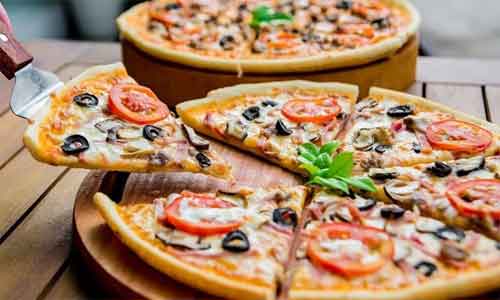- Home
- Editorial
- News
- Practice Guidelines
- Anesthesiology Guidelines
- Cancer Guidelines
- Cardiac Sciences Guidelines
- Critical Care Guidelines
- Dentistry Guidelines
- Dermatology Guidelines
- Diabetes and Endo Guidelines
- Diagnostics Guidelines
- ENT Guidelines
- Featured Practice Guidelines
- Gastroenterology Guidelines
- Geriatrics Guidelines
- Medicine Guidelines
- Nephrology Guidelines
- Neurosciences Guidelines
- Obs and Gynae Guidelines
- Ophthalmology Guidelines
- Orthopaedics Guidelines
- Paediatrics Guidelines
- Psychiatry Guidelines
- Pulmonology Guidelines
- Radiology Guidelines
- Surgery Guidelines
- Urology Guidelines
Insulin bolus 15 min before eating pizza controls blood sugar in diabetes: Study

Naples, Italy: Blood sugar control after a pizza meal in diabetes patients can be managed by using a simple insulin bolus 15 min before eating, a recent study in the journal Diabetes Technology & Therapeutics has pointed out. Hyperglycemia can be further improved by increasing the fermentation time of the pizza dough.
Pizza is complex food and causes prolonged post-meal hyperglycemia. Glycemia following pizza consumption is typically managed with a dual-wave insulin bolus. Angela Zanfardino, the University of Campania “Luigi Vanvitelli,” Naples, Italy, and colleagues evaluated the effect of a simple bolus on glycemia following consumption of traditionally prepared pizzas with long (24 h) or short (8 h) dough fermentation periods.
For the study, 38 children with type 1 diabetes (N=38) with sensor-integrated pump therapy were asked to consume pizza with two different dough fermentation (short fermentation time, pizza A and long fermentation time, pizza B) on two separate evenings. The blood glucose was monitored over 11 h. A simple insulin bolus was administered 15 min preprandial. The carbohydrate and amino acid contents of the two types of pizza were analyzed by liquid chromatography and high-resolution mass spectrometry (LC-HRMS).
Key findings of the study include:
- The mean (±standard deviation) time in range 3.9–10.0 mmol/L was 73.2% ± 23.2%, and 50.8% ± 26.7% of glucose measurements were within the range 3.9–7.8 mmol/L.
- During the 2 h after bolus administration, the meantime in range 3.9–7.8 mmol/L was significantly greater with pizza B than with pizza A (73.3% ± 31.5% vs. 51.8% ± 37.4%, respectively), and the time in hyperglycemia (>10 mmol/L) was significantly shorter (mean percentage 6.1% ± 19.0% vs. 17.7% ± 29.8%, respectively).
- LC-HRMS analysis showed that long fermentation was associated with a lower carbohydrate content in the pizza, and a higher amino acid content.
Glycemia following consumption of traditionally prepared pizza can be managed using a simple bolus 15 min before eating. Glycemic control can be further improved by increasing the dough fermentation time.
The study, "Demystifying the Pizza Bolus: The Effect of Dough Fermentation on Glycemic Response—A Sensor-Augmented Pump Intervention Trial in Children with Type 1 Diabetes Mellitus," is published in the journal Diabetes Technology & Therapeutics.

Disclaimer: This site is primarily intended for healthcare professionals. Any content/information on this website does not replace the advice of medical and/or health professionals and should not be construed as medical/diagnostic advice/endorsement or prescription. Use of this site is subject to our terms of use, privacy policy, advertisement policy. © 2020 Minerva Medical Treatment Pvt Ltd